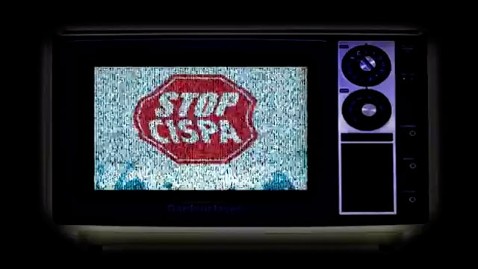Talk Pushes Online 'Blackout' to Protest CISPA

Image credit: YouTube
Last year, sites all around the Internet chose to run a "blackout" by displaying censorship bars and statements of opposition to Internet censorship as part of a coordinated protest of the Stop Online Piracy Act (SOPA) and the Protect IP Act (PIPA). Now, word is spreading about a similar online protest to oppose another Internet-centered bill that recently passed the U.S. House of Representatives and is set to hit the U.S. Senate soon - the Cyber Intelligence Sharing and Protection Act (CISPA).
Some on Twitter have begun tweeting the hashtag #CISPABlackout to promote a proposed April 22 "blackout."
Call ur favorite websites to #blackout for 24 hours. Let's show the unity and power of the Internet they're trying 2 exploit! #CISPABlackout
— Anonymous (@YourAnonNews) April 18, 2013
Though proponents see the bill as a strong measure to fight cyber threats and better protect citizens, organizations like the American Civil Liberties Union, The Internet Defense League and the Electronic Frontier Foundation oppose CISPA because of the jurisdiction it would provide for the federal government to procure personal information shared with some private-sector entities (perhaps, for instance, private information you may be sharing via Google or Facebook).
Under CISPA, Google, Facebook, Twitter, Microsoft, others can't promise to protect your privacy #CispaBlackout
— Sherry Mitchell (@2ndSMitchell18) April 19, 2013
The original draft of CISPA first passed the House in 2012, but died in the Senate and was publicly opposed by the White House.
"The administration strongly opposes [CISPA], in its current form," President Obama's Office of Management and Budget said in a statement last year.
The office of the president hasn't changed its tune for CISPA 2013, recently saying in a statement, "The administration still seeks additional improvements, and if the bill, as currently crafted, were presented to the president, his senior advisers would recommend that he veto the bill."
READ: CISPA Cybersecurity Bill Passes House, Again
The cautious speculation is that CISPA round two will likely meet its end in the Senate again, but groups that oppose it seem a bit louder this time as the bill is being reconsidered.
CISPA did not receive the "blackout" treatment in 2012 that SOPA/PIPA did largely because the campaign lacked the voices of some of the Internet giants. Google and Wikipedia, for example, posted protests against SOPA/PIPA last year, but neither company has publicly displayed direct opposition to CISPA in its first form or in the 2013 redraft.
A Google spokesperson spoke to Forbes about CISPA in 2012, saying, "We think this is an important issue and we're watching the process closely but we haven't taken a formal position on any specific legislation."
Rey Ramsey, the CEO of lobbying group TechNet, which claims Google, Yahoo, Microsoft and Apple as clients, actually expressed an endorsement of the measures in CISPA with a letter to the House last week, as reported by RT.
"This bill recognizes the need for effective cyber-security legislation that encourages voluntary, bi-directional, real time sharing of actionable cyber threat information to protect networks," Ramsey wrote.
With the big names sitting by quietly, opposition forces may need extra effort from staunch supporters to get the message out. So far, the showing for an April 22 "blackout" looks to be lacking.
If @ reddit actually decides to participate in the #CISPAblackout, we could make some real progress here.
— Eric ? (@itsericbrown) April 19, 2013
ABC News attempted to contact several sites and organizations with prior statements of opposition to CISPA. So far, none have given comment as to whether or not they would consider participating in the proposed "blackout."